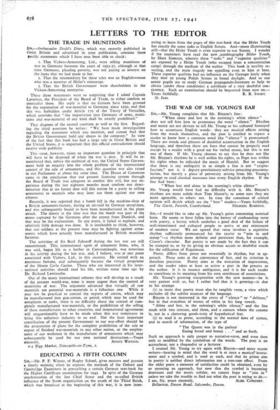LETTERS TO THE EDITOR
THE TRADE IN MUNITIONS
SIR,—Ambassador Dodd's Diary, which was recently published in Great Britain and advertised in your publication, contains three becific statements which I have now been able to check: r. That Vickers-Armstrong, Ltd., were selling munitions of war to Germany between the years of 1933-37, although at that time Germany, pleading poverty, was not paying us interest on the loans that we had made to her.
2. That the intermediary for these sales was an Englishwoman who was a member of Hitler's entourage.
3. That the British Government were shareholders in the Vickers-Armstrong enterprise.
These three statements were so surprising that I asked Captain Lyttelton, the President of the Board of Trade, to either confirm or contradict them. His reply is that no licences have been granted for the exportation of war-material to Germany since 1930, and that this wa. forbidden under Article 170 of the Treaty of Versailles, which provides that " the importation into Germany of arms, muni- tions and war-material of any kind shall be strictly prohibited."
That disposes of the second assertion as well as the first. Regard- ing the third assertion he writes: " We have made investigations regarding the statement which you mention, and cannot find that the British Government hold any shares in the company." In view of the fact that this book has had a large sale in Great Britain and the United States, it is important that this official contradiction should receive wide publicity _ This issue, however, raises an important question in principle that will have to be disposed of when the war is over. It will be re- membered that, before the outbreak of war, the United States Govern- ment held an enquiry into the whole problem of the international control of the sale of armaments, and this question was also raised in our Parliament at about the same time. The House of Commons came to the conclusion that our present licensing system through the Board of Trade was adequate to combat this evil, but our ex- perience during the last eighteen months must confirm our deter- mination that at no future date will this nation be a party to selling armaments to neutrals who may later use them against our own citizens.
Recently, it was reported that a bomb fell in the machine-shop of a British armament-factory, during an air-raid by German aeroplanes, and vas subsequently found to have been manufactured in the plant struck. The theory at the time was that the bomb was part of the stores captured by the Germans after the retreat from Dunkirk, and that may be the explanation. In any event, it failed to explode, and relatively little damage was done. It is intolerable to think, however, that our soldiers at the present time may be fighting against arma- ments which have actually been manufactured in British munition factories.
The activities of Sir Basil Zaharoff during the last war are still remembered. This international agent of armament firms, who, it was said, began -life as a barber in Constantinople, was notorious in his activity during the last war, and, I believe, was at one point associated with Vickers, Ltd., in this country. He retired with an enormous fortune, and subsequently became the virtual proprietor of the Monte Carlo Casino. Those who are interested in his inter- national activities should read his life, written some time ago by Dr. Richard Lewinsohn.
Out of the many international reforms that will develop as a result of the present world-war, none is more urgent than the control .of munitions of war. The argument advanced that virtually all raw materials are potential war-materials is a fallacious one. While it may not be practical to control the exports of cotton, which may be manufactured into gun-cotton, or petrol, which may be used for aeroplanes or tanks, there is no difficulty about the control of com- pletely manufactured war-materials, or the prohibition of the selling of these manufactures to other countries, and international agreements will unquestionably have to be made when this war terminates to bring this nefarious industry to an end. Not the least important contribution of the present Government to our war-effort should be the preparation of plans for the complete prohibition of the sale or export of finished war-materials to any other nation, or the employ- ment of our workmen in the manufacture of armaments which may subsequently be used for our own national destruction.—Yours
sincerely, 'ANGUS WATSON. 2-4 Bigg Market, Newcastle-on-Tyne, i.






















 Previous page
Previous page